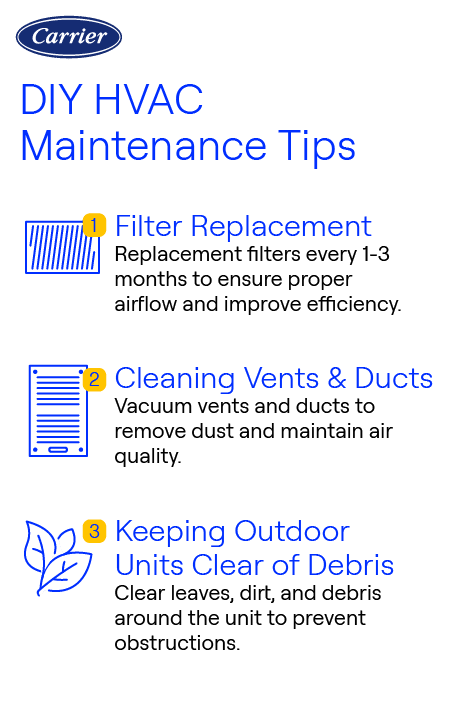Your Guide To Annual HVAC Maintenance
Whether it’s a spring tune-up, a fall clean-and-check, or it’s simply been a while since you’ve had your HVAC system professionally worked on, you may be asking looking for HVAC maintenance. This guide walks through the importance of HVAC maintenance and the types of HVAC maintenance.
Five Reasons Why HVAC Maintenance Is Essential
HVAC maintenance is crucial for several key reasons, ensuring that your heating, ventilation, and air conditioning system operates efficiently and effectively.
Jim Snyder, owner of Irish Air Now in Indianapolis, Indiana, says it’s vital for homeowners to schedule annual HVAC maintenance.
“Every HVAC or consumer advocacy group recommends maintaining your system annually — look anywhere,” Snyder said. “Regular maintenance keeps your system operating efficiently and safely. A solid maintenance record is also valuable when buying or selling a home, as systems with documented maintenance tend to pass inspections more easily than those without.”
Let's dive deeper into five reasons why HVAC maintenance is important:
1. Increased Energy Efficiency
Regular maintenance, such as cleaning coils, changing filters, and lubricating parts, helps your system run more efficiently, reducing energy consumption and lowering heating and cooling bills.
2. Extend HVAC System Lifespan
Routine inspections and tune-ups prevent wear and tear, reducing the risk of breakdowns and prolonging the life of your HVAC system. This can delay the need for costly replacements.3. Prevent Costly Repairs
Regular check-ups help identify small issues before they become major problems. Addressing these minor repairs early on can save you from expensive, unexpected repairs down the road. Learn more about HVAC repair.4. Improved Air Quality
HVAC systems filter the air in your home. Maintenance tasks like cleaning or replacing filters and cleaning ducts and coils reduce dust, allergens, and pollutants, leading to better indoor air quality.5. Consistent Comfort
A well-maintained system can consistently regulate temperature and humidity, ensuring even heating and cooling throughout your home without unexpected performance drops. Check out our pages on AC maintenance, heat pump maintenance, and furnace maintenance for a more in-depth analysis on maintenance for specific types of HVAC equipment.
What Does HVAC Maintenance Include?
Preventative HVAC Maintenance
- Cleaning Coils: Cleaning evaporator and condenser coils to improve heat transfer and efficiency. Learn more about air conditioner coil cleaning and how to clean evaporator coils.
- Thermostat Calibration: Checking and calibrating the thermostat for accurate temperature control.
- Inspecting Ductwork: Ensuring ducts are sealed and not leaking air, improving energy efficiency.
- Lubricating Moving Parts: Lubricating motors, bearings, and other moving components to reduce friction and wear.
- Checking Refrigerant Levels: Inspecting refrigerant levels in air conditioners and heat pumps, recharging if necessary.
- Tightening Electrical Connections: Checking and tightening loose electrical connections to prevent power failures.
- Inspecting Drain Lines: Clearing condensate drain lines to prevent clogs and water damage.
- Fan and Blower Inspection: Ensuring fans and blowers are working efficiently and making adjustments if needed.
Corrective HVAC Maintenance
- Replacing Worn Parts: Changing worn-out components like belts, motors, and capacitors.
- Duct Repairs: Sealing or repairing damaged ductwork that’s causing air leaks.
- System Tune-Up: Adjusting the system to improve performance if there are signs of inefficiency, such as uneven cooling or heating.
- Fixing Refrigerant Leaks: Identifying and repairing refrigerant leaks in cooling systems.
Seasonal HVAC Maintenance
- Heating Season Maintenance: This includes checking the furnace, cleaning burners, inspecting the heat exchanger, and ensuring the system is ready for winter.
- Cooling Season Maintenance: This involves inspecting the air conditioner, cleaning coils, and checking refrigerant levels before summer.
Annual Comprehensive HVAC Maintenance
- Comprehensive Inspection: A full assessment of the HVAC system, identifying any potential issues before they become major problems.
- Performance Testing: Testing the overall efficiency and performance of the system.
Three DIY HVAC Maintenance Tips

1. Filter Replacement
Replacing your air filter every 1-3 months improves airflow and indoor air quality while reducing strain on your system. A clogged filter forces the furnace or AC to work harder, leading to higher energy bills and potential breakdowns.. Learn more about andhow to change air filters2. Cleaning Vents and Ducts
3. Keeping Outdoor Units Clear of Debris
For central AC or heat pumps, clear leaves, dirt, and debris from around the outdoor unit. Maintain at least two feet of clearance around the unit and gently rinse the condenser coils with a garden hose to remove buildup.Connect With Your Carrier Dealer For HVAC Maintenance Near Me

Frequently Asked Questions About HVAC Maintenance
Learn More About HVAC Maintenance
- Discover air conditioner maintenance Tips
- Explore the importance of furnace maintenance
- Learn the value of heat pump maintenance
- Get in the know on DIY mini split maintenance
- Explore HVAC repair service tips

